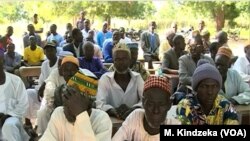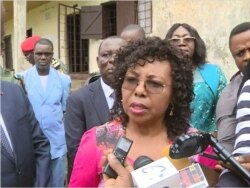Cameroon's civil society groups are urging young people to return to schools in the country's volatile English-speaking regions. Most schools in the two regions have been closed because of attacks and kidnappings stemming from the war between separatists and the military.
The back-to-school campaign is being carried out by associations of traditional rulers, clergy, parents and members of Cameroon's national assembly.
"We have come with a message of peace so that our children should go back to school," Donatus Nembo, who works for the education department of the Catholic Church, said of his group's efforts speaking to parents in the market square in Menji, southwest Cameroon.
"To those of our children who are still holding arms we are begging, begging them to lay down their arms, join us in good faith," he said. "They should trust us, because with us they can be re-integrated so that together, we continue to rebuild our division [administrative area] which has been rendered backward."
Nicoline Asherri, 16, is excited to go back to school.
"Yes, I really want to go back to school," she said. "We cannot sit for years without schooling. It is not normal. … Seriously, so that we can go back to school because children are growing and some of them will never go back to school again. Some of them are already pregnant, some of them have gone astray now."
Asherri has not been in school for two years, since she and 90 other students were kidnapped from a college in the northwestern town of Kumbo and released after two days.
The fighters had warned school authorities to stop all academic activity.
Teacher Mercy Beri says she is afraid to return to her high school.
"I was kidnapped. My principal was kidnapped. How do you expect me to go back?" she said. "I do not know whether if I go back they will kidnap me or what. Schools have been burned, they have not done any reconstruction. Where are we going to be teaching the children? How are we going to teach them, where, in space? Outside? How are the children going to be secured?"
An estimated 80 percent of the schools in the north and southwest have been closed since separatists began their uprising in 2017, citing the alleged overbearing use of French in the African country.
The only schools still open are in big towns such as Bamenda, capital of the northwest region, and Buea, capital of the southwest region, where there is relative calm.
Cameroon's minister of secondary education, Nalova Lyonga, praised children and teachers who want to brave the crisis and return to schools in their villages.
"It takes a lot of courage to get up and say, 'I am going to school at this time,'" Lyonga said. "That is why I am here to say that you have carried the sacrifice so far. Carry it to the end. These are people who have sacrificed a lot."
The government says at least 130 schools have been burned by separatist fighters. But on social media, separatists blame the military, saying it is destroying schools suspected of being used as hiding places by the fighters.
The military has denied the accusation.





